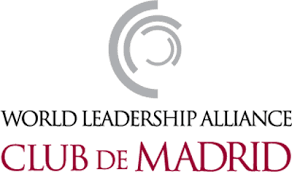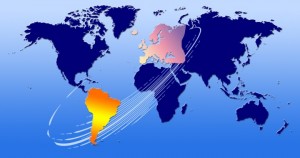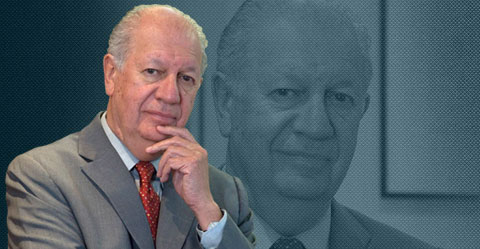Climate Change is an  undeniable reality affecting the planet and humankind. It is also an existential threat for future generations. For over a decade, the Club de Madrid and its more than 100 Members, all former Presidents and Prime Ministers from more than 65 countries, have been vigorously advocating for an ambitious, effective and fair global climate regime. President Trump’s decision to withdraw the U.S. from the landmark Paris Climate Agreement has left us and many around the world baffled and concerned, not only about the future of global climate and environmental policy, but also about the impact that this decision may have on international relations moving forward. Continue Reading
undeniable reality affecting the planet and humankind. It is also an existential threat for future generations. For over a decade, the Club de Madrid and its more than 100 Members, all former Presidents and Prime Ministers from more than 65 countries, have been vigorously advocating for an ambitious, effective and fair global climate regime. President Trump’s decision to withdraw the U.S. from the landmark Paris Climate Agreement has left us and many around the world baffled and concerned, not only about the future of global climate and environmental policy, but also about the impact that this decision may have on international relations moving forward. Continue Reading
 We are about to embark upon a very important process that could define the parameters for nigh-on complete integration between Latin America and the Caribbean and the European Union. And this, strange as it might seem, might well create the conditions for a very wide-ranging agreement over the integration of Latin America, using the agreement with Europe as its basis. Continue Reading
We are about to embark upon a very important process that could define the parameters for nigh-on complete integration between Latin America and the Caribbean and the European Union. And this, strange as it might seem, might well create the conditions for a very wide-ranging agreement over the integration of Latin America, using the agreement with Europe as its basis. Continue Reading
 Sadly, the year ended in the same way as it began. The emergence of ISIS in the world order and the demonstration of its strength as a terrorist power, first with the attack on the offices of the Charlie Hebdo weekly and then the terrorist attacks on the 13th of November in Paris, show that over the year it has not only consolidated itself but also exposed global powers’ troubles dealing with a non-state actor seeking to become a sovereign state. Continue Reading
Sadly, the year ended in the same way as it began. The emergence of ISIS in the world order and the demonstration of its strength as a terrorist power, first with the attack on the offices of the Charlie Hebdo weekly and then the terrorist attacks on the 13th of November in Paris, show that over the year it has not only consolidated itself but also exposed global powers’ troubles dealing with a non-state actor seeking to become a sovereign state. Continue Reading
 In the year 2000, during my first presidential state of the nation speech, I said: “Chile must be at the vanguard of countries that use information technologies, especially the internet, as a driver of progress. Progress based on the flexibility of companies rather than their size, on people’s intelligence rather than geographic proximity, on cooperation rather than protagonism. We are standing at the threshold of a distinct, different epoch.”
In the year 2000, during my first presidential state of the nation speech, I said: “Chile must be at the vanguard of countries that use information technologies, especially the internet, as a driver of progress. Progress based on the flexibility of companies rather than their size, on people’s intelligence rather than geographic proximity, on cooperation rather than protagonism. We are standing at the threshold of a distinct, different epoch.”
 The emergence of new technologies and especially social networks first took place in people’s private, everyday spaces. Before businesses and governments got in on the act, ordinary citizens started to link to each other over networks, transforming the way they related to each other forever.
The emergence of new technologies and especially social networks first took place in people’s private, everyday spaces. Before businesses and governments got in on the act, ordinary citizens started to link to each other over networks, transforming the way they related to each other forever.
 The progressive governance dialogues began at the close of the 20th century after the fall of the Berlin Wall. The collapse of the Soviet system did not bring about “the end of history”, as some claimed. It did, however, inspired a fundamental rethinking among social democrats and progressives about how to approach a new world order characterized by globalization and the information technologies revolution. Continue Reading
The progressive governance dialogues began at the close of the 20th century after the fall of the Berlin Wall. The collapse of the Soviet system did not bring about “the end of history”, as some claimed. It did, however, inspired a fundamental rethinking among social democrats and progressives about how to approach a new world order characterized by globalization and the information technologies revolution. Continue Reading
 Let me begin by saying that I am against the consumption of drugs. They are damaging to people’s health and I will always be on the side of a system that seeks to improve people’s quality of life and wellbeing. However, what are the appropriate measures for achieving this desired state given the sustained increase in drug consumption and trafficking and the crime rates associated with these activities?
Let me begin by saying that I am against the consumption of drugs. They are damaging to people’s health and I will always be on the side of a system that seeks to improve people’s quality of life and wellbeing. However, what are the appropriate measures for achieving this desired state given the sustained increase in drug consumption and trafficking and the crime rates associated with these activities?
In 1961, at the United Convention on Narcotics, it was decided to combat drugs and drug trafficking through their illegalization. However, this policy, which has been in force for the last 55 years, has failed. Between 1998 and 2008 alone, global consumption of opium and cocaine increased from 13 to 17 million people while for marijuana the increase was 10%, rising from 134 to 147 million consumers. This situation shows us that criminalization does not prevent consumption and leads to the empowerment and enrichment of dangerous cartels capable of controlling police and state structures. How can an economic empire worth almost 300 billion dollars a year be dismantled? Continue Reading
 The challenge of fighting climate change in Latin America must be approached together and not with separate public policies in each country. We can exchange experiences, but it is more important still that we commit to speaking with one voice and reaching a regional consensus so we can address international meetings and accords as one single continental country. Continue Reading
The challenge of fighting climate change in Latin America must be approached together and not with separate public policies in each country. We can exchange experiences, but it is more important still that we commit to speaking with one voice and reaching a regional consensus so we can address international meetings and accords as one single continental country. Continue Reading
Infrastructure is an essential factor in improving a country’s productivity and quality of life. As Minister of Public Works and later as President, I took part in the concessions process for public projects that transformed and connected Chile along its North-South axis, allowing the country to catch up with and meet demands for efficiency and speed in a globalized world.
To implement the infrastructure that Chile will need in 20 years’ time, an investment of more than 100 billion dollars is required. This almost inconceivable figure can be obtained thanks to the current economic conditions. At the moment we have capital worth 37 billion dollars generated by concessions granted since 1994 and the current international financial market is prepared to offer bonds of 50 and even 100 years. With the resources we have available, the challenge is to dream big, to make the capital we have work for us and to be decisive enough to make large scale investments. Continue Reading
 The first encyclical by Pope Francis, Laudato si’ – Alabado seas, does not seem to have left anyone unmoved. An encyclical is the most important document published by the Catholic Church. It is addressed to the Catholics of the world and the Pope uses it to clearly define the Church’s point of view. However, Laudato si’ is aimed at all of the planet’s inhabitants, regardless of religion, because it addresses the fate of humanity. It is not concerned with the fate of Planet Earth itself, because it will continue to exist, but rather how likely it is that human life as we know it today will continue to survive on the planet if we don’t learn to look after it. This is the encyclical’s fundamental lesson for us all. Continue Reading
The first encyclical by Pope Francis, Laudato si’ – Alabado seas, does not seem to have left anyone unmoved. An encyclical is the most important document published by the Catholic Church. It is addressed to the Catholics of the world and the Pope uses it to clearly define the Church’s point of view. However, Laudato si’ is aimed at all of the planet’s inhabitants, regardless of religion, because it addresses the fate of humanity. It is not concerned with the fate of Planet Earth itself, because it will continue to exist, but rather how likely it is that human life as we know it today will continue to survive on the planet if we don’t learn to look after it. This is the encyclical’s fundamental lesson for us all. Continue Reading




